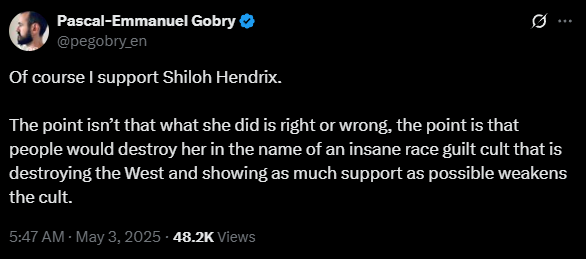You may not like what Shiloh Hendrix did — and that’s the point
As of this publication, Shiloh Hendrix has raised over $542,000 after a Somali immigrant (and alleged pedophile kidnapper, hanging out at a park in the middle of the day on a Wednesday for some reason) accused her of calling an unattended 5-year-old the hard R.
She doesn’t deny the accusation, saying “he acted like one” — apparently stealing from her diaper bag.
What’s remarkable about this incident is how irrelevant the specifics of the fact pattern are.
We’re used to dissecting these events meticulously in order to win a moral argument about who is “in the right”.
13 years ago, it mattered very much to people how young Trayvon Martin was, or appeared to be — did his bag of Skittles make him a child, did his hoodie make him a thug — his height relative to George Zimmerman, the exact circumstances of first contact, the tempo of escalation and who drove it, the bruising on the back of Zimmerman’s head, etc.
This all mattered because it was literally a “court of public opinion” — we litigated the particulars of the case as if we were jurors, considering the facts of the case to decide who behaved improperly, which individual was at fault. Put another way, we were judging — “fault-finding”.
But we were baffled by how little the particulars seemed to matter to those who took the other side — on Trayvon Martin, Michael Brown, George Floyd, Ahmaud Arbery, Kyle Rittenhouse, etc. — because for them, the event was wholly symbolic and tribal.
To the extent that they cared enough about the facts to investigate at all, everybody knew (for instance) that OJ did it — but that wasn’t the point.
The point, in their minds, was that the structure in which he stood accused was hostile and illegitimate — and since several people of that persuasion (I’m not gonna say what people, what persuasion) made it into OJ’s jury, they had material power to defy and deconstruct that system, and get Their Guy out of trouble.
Shiloh’s fundraiser demonstrates that a large number of people now view the structure in which she stands accused as fundamentally hostile and illegitimate.
They aren’t weighing in on the details of her case, except to compare it to other cases: in particular, comparing her use of a bad word to the murder of Austin Metcalf by Karmelo Anthony, on which the Anthony family raised $518,000.
A decade ago, the discussion would have been about what is Okay and Not Okay to say to unattended five-year-olds at the park.
But now, at least in the minds of many, the propriety of her specific behavior is irrelevant. The topic of discussion is now:
What kind of public behavior is tolerated from white people versus black people
Which parties are permitted to organize around “systemic” grievances
Who gets to sit behind the camera and direct the apparatus of social judgment and financial coercion
Viewed in those terms, people are reaching very different conclusions than they would have under the old paradigm.
Like so many domains of American life, race relations seem to be transitioning from a slow decay to a crash.
Since its inception, social media has intensified radical racial consciousness among both blacks and whites through uncontrolled (possibly uncontrollable) distribution of video, revisionist history, statistics, etc. which would never have been presented in legacy media.
But social media also allowed the regime to target and punish non-professional dissidents.
If you had a W-2 job at a corporation with an HR department, “social media outrage” provided an easy pretext to fire you for any speech against the structure of the post-1964 civil rights regime — because public association with such speech, by definition, created a “hostile work environment” for co-workers who belonged to any of the classes protected by that regime.
These two forces are sufficient to explain the shape of race relations over the last fifteen years. One side goaded to violence-as-speech, and the other punished for speech as if it were violence.
“Cancel culture” was a domestic version of the same enforcement pattern that doomed US counter-extremism efforts in the Middle East: punishing only the highest-visibility enemies, while actively nurturing the conditions that create more of them.
This has given enemies of the regime room to refine messaging, organize, and build muscle underground to evade or absorb the worst of the regime’s punishments.
In other words, the state’s method of punishing social media dissent has served as a massive gain-of-function experiment for its own opposition.
Shiloh Hendrix’s offense against the civil rights regime is about as high-visibility and eminently punishable as possible — probably the least-optical way to transgress against the liberal consensus without committing an actual crime.
Whatever punishments the regime can inflict, Hendrix will get with both barrels — but unless they can come after her kids (she needs to get out of Minnesota immediately) or convince some “rogue element” to attack her physically, there’s basically no way that the consequences outweigh the payout she is about to receive.
She’ll likely never have a W-2 job as long as the 1964 regime endures; but this kind of person usually doesn’t mind becoming Professionally Online, and if she has even moderately competent assistance, she’ll almost certainly be better off.
This suggests that the gain-of-function experiment has reached its conclusion: the most potent “cultures” are now completely treatment-resistant. All sorts of less-extreme violations of the 1964 regime now feel, not only survivable, but potentially profitable.
Critically, Hendrix’s actions will probably not be broadly popular, even among conservative whites.
The problem for the regime is not that white popular opinion has shifted away from them — it hasn’t — but in some ways that would be a simpler problem, the kind of problem Western liberal democracies are actually built to solve.
The problem is that a critical mass of people and money has become politically activated, so that transgressors against the regime will receive unconditional support regardless of popular opinion.
You may not like what Shiloh Hendrix did — and that’s the point. A person can now be exposed to tens of millions of people, doing something most of them think is reprehensible, and it’s just not up to them to decide what becomes of her.
That’s a major driver of the enthusiasm: it’s a rebellion against this apparatus of punishment and the people who wield it.
And this mechanism — the power to tell tens of millions of people who the good guys and bad guys are, and then punish your enemies with the enthusiastic consent of the mob — is the bedrock of the Western liberal democratic system.
It’s the only way people know how to behave in a post-Christian society — how liberals figure out what a Decent Fucking Human Being is.
The Hendrix case demonstrates that that system is failing catastrophically, for better and worse.
After decades of one-sided suppression of radical energy, we are entering a loop of bilateral escalation.
What Hendrix said is mild in comparison with the racial abuse that we’ve come to accept as routine from the other side, and certainly not comparable to murder — but that won’t matter to the logic of acceleration.
The consequences of the escalation will, as always, fall first on people like her — downscale whites who can’t afford to evade the consequences of the Civil Rights Act. The offer of this mode of escape will almost certainly tempt imitators.
GiveSendGo’s founder is “standing on principle” with respect to the Karmelo Anthony fundraiser. If the feds were smart, they would have leaned on this guy before Anthony got his money — before this thing got so far out of hand — but here we are. The payment processors are almost certainly raising a ruckus behind the scenes. It will be interesting to see if Hendrix actually gets paid.
In the end, though, it doesn’t matter — decentralized crowdfunding already has mainstream penetration.
Johnny Somali’s business model was intolerable when only people like Johnny Somali were allowed to use it — but if poor whites start playing it in earnest, there’s really no telling where things might end up.
The liberal consensus is dead; what matters now is what comes after.
Ernst Junger published The Forest Passage in 1951, at the very dawn of the postwar liberal order. He recognized, as so many failed to, that all the managerial systems of the early 20th century were totalitarian — and that liberal democracy was, in some ways the most insidious, since it required not just obedience, but enthusiastic consent to function. The authoritarians could make you say the right things, but liberals demanded that you actually believe them.
The purpose of propaganda was not merely to convince you of particular propositions, but to draw the individual up into the world of global forces and conflicts in which he was totally helpless and insignificant — unless he joined himself to the superorganism and “did his bit”.
Today, we are at the twilight of that order — not because the tools of manufacturing consent have lost their potency, but because they are overpowering the institutions that created them.
Having effortlessly unraveled the old order, the postmodern organs of narrative generation are now powerless against themselves — every new attempt at “sense-making” instantly intercepted by swarms of counter-narrative.
The same tools that allowed the mega-states of the 20th century to mobilize millions are now empowering micro-mobilization in micro-conflicts — a million little tumors of power that are rapidly choking the state.
But the tools themselves are stronger than ever — and Junger’s insight about the difficulty of holding on to one’s soul in the face of these forces is more true now than when he wrote it. These systems are too powerful and too alien — we cannot allow ourselves to be ruled by them.
The only hope for the nation as a whole is the return of human control of the government — but that’s something over which I have no influence. What I can do is build something human with my friends.
The totalizing liberal consensus, with all its injustice and hypocrisy, is imploding up its own ass, and that is of course worth celebrating — but now we need to get the things we care about out of the blast radius, and build for what comes after.






Thanks for sharing your thoughts on this. Every day it seems we get more evidence that the old order is dying. I wonder what will come after, but like you, my focus is on strengthening my family and preparing for the troubles.
Commenting before reading, I apologize if this post addresses this in any way
I dug into this event last night, and part of me thinks the whole thing is a hoax. I don't know.
But basically, I wanted to reach out to this woman to express support, so I spent almost half an hour looking for her contact information. I couldn't find anything. I couldn't even find any record of her being a real person online.
Meanwhile, she's raised half a million dollars because she needs to move to a new city because everyone is posting her private identifying information online. The same information that I couldn't find with a half an hour of searching.
It could be that the news coverage is just drowning out the search results. It could be that she meant this information is being traded privately, in woke activist group chats. But all I know is, she has half a million dollars because people posted her information online, but I can't find any of that information. Take that as you will.